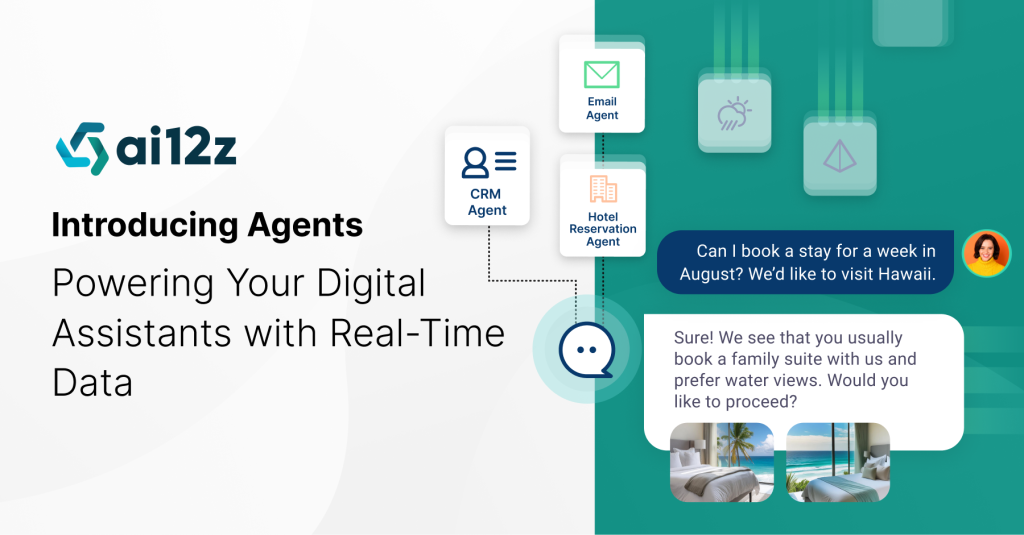
We’re excited to introduce agents into our copilot platform, transforming standard websites into interactive environments. Digital assistants can now perform tasks personalized to each site visitor by leveraging real-time data from external sources.
What’s an agent?
An agent is a tool that interacts with third-party systems to retrieve data and provide it to the digital assistant.
Until now, we’ve gone live with a RAG (Retrieval Augmented Generation) solution, which enhanced chatbot interactions by integrating an organization’s content with an LLM. You can quickly go live with a chatbot versus taking months to build one! Users’ questions related to products, services, or the company, can immediately be answered based on all the content provided by the organization.
Now we’ve gone live with an agent toolkit, so a digital assistant can communicate with third-party systems to retrieve specific data and provide it back to the copilot digital assistant.
A digital assistant can call multiple agents in parallel to perform specific functions, which is often necessary.
Agents now available out-of-the-box and their functions:
- Google Search and Web Scraping Agent: Searches the web, retrieves, and summarizes content directly relevant to user queries.
- Math Agent: Performs calculations as requested.
- Stock Agent: Retrieves up-to-date stock information.
- Weather Agent: Provides current weather forecasts and updates.
- Email Agent:Manages sending emails.
- Date / Time Agent: Provides date and time information.
- CRM Integration (Salesforce, HubSpot): Accesses customer data to personalize interactions and responses.
- Google Maps (Directions) and Google Places Agent: Provides directions to the user with a Google Map.
- And more!
Creating custom agents:
Even more powerful, organizations can create their own custom agent through a webhook. This webhook provides the copilot with real-time information as it happens, allowing it to call any JSON REST API, which connects with the backend system as required.
This is incredibly powerful for organizations because each company has its own data sources and third-party systems unique to their operations. This enables them to implement any agent needed to be called upon by the copilot.
Real-world applications:
Event ticketing: From selecting dates to finalizing ticket purchases, each step is managed by the appropriate agent, streamlining the process and enhancing user satisfaction.

Hotels: Users can book hotel stays, find restaurants, and make reservations, and schedule activities—all through our copilot, acting like a hotel concierge.
Imagine a user wants to book a stay for the week of August 11. The copilot communicates with the CRM agent to understand preferences like suite preferences or view types. Once preferences are set, it engages the booking agent to finalize the reservation. If the user then seeks a restaurant reservation, the copilot coordinates with the restaurant reservation agent, which secures the booking and confirms it via the email agent.
Retail: A user interested in outdoor gear, such as a 2-person tent for 3 seasons, will receive personalized recommendations based on their preferences and browsing history. The copilot talks to the inventory / catalog agent to see what tents are available. Each tent will have title, description, number of people it fits, seasons it can be used for, brand name, etc. They can even compare tents side by side via our Compare feature. The copilot will continue the conversation with the user to narrow down which tent they would prefer, and then provide back a link to purchase. If the user wants to visit the store in person before buying, they can get directions to the store from the digital assistant, which will call the Google Maps agent.

With the use of agents, our platform has the power to transform brands’ web experiences.
Want to see it in action? Contact us and we’ll show you a demo.